Rehabilitation Therapies

Hope finds its way back, and lives are rebuilt, one step at a time. In this series, we embark on a journey through five pillars of healing and empowerment—Physical Therapy, Occupational Therapy, Speech & Language Therapy and Audiology, Child Psychology, and Special Education (IEP), ADL (Activities of Daily Living). These therapies are about unleashing potential, restoring independence, and nurturing resilience in those who dare to dream beyond adversity.
Physical Therapy
The Physical Therapy program is all about empowering children to reach their highest level of independence. We do this by making the journey fun and engaging. Before diving into formal therapy, our dedicated physiotherapists build a rapport with the children through play, creating a comfortable and trusting environment.
- Screening for developmental disabilities
- Supercharging those big motor skills
- Fun exercises that build strength and improve range of motion
- Boosting endurance to keep going strong
- Nailing the art of balance and coordination
- A friendly approach to managing weight
- Keeping those muscles in check
- Finding the right position
- Walking tall with gait training
- Getting comfy with assistive devices like walkers
- Making homes more accessible with assessments and tweaks
- Helping parents become the ultimate support team with training and home exercise plans
- Expert advice on safe and comfy positioning and carrying at home
- Equipping parents with home-based exercises
- Strategies to steer clear of any stiffness or deformities
- Handy tips on equipment use
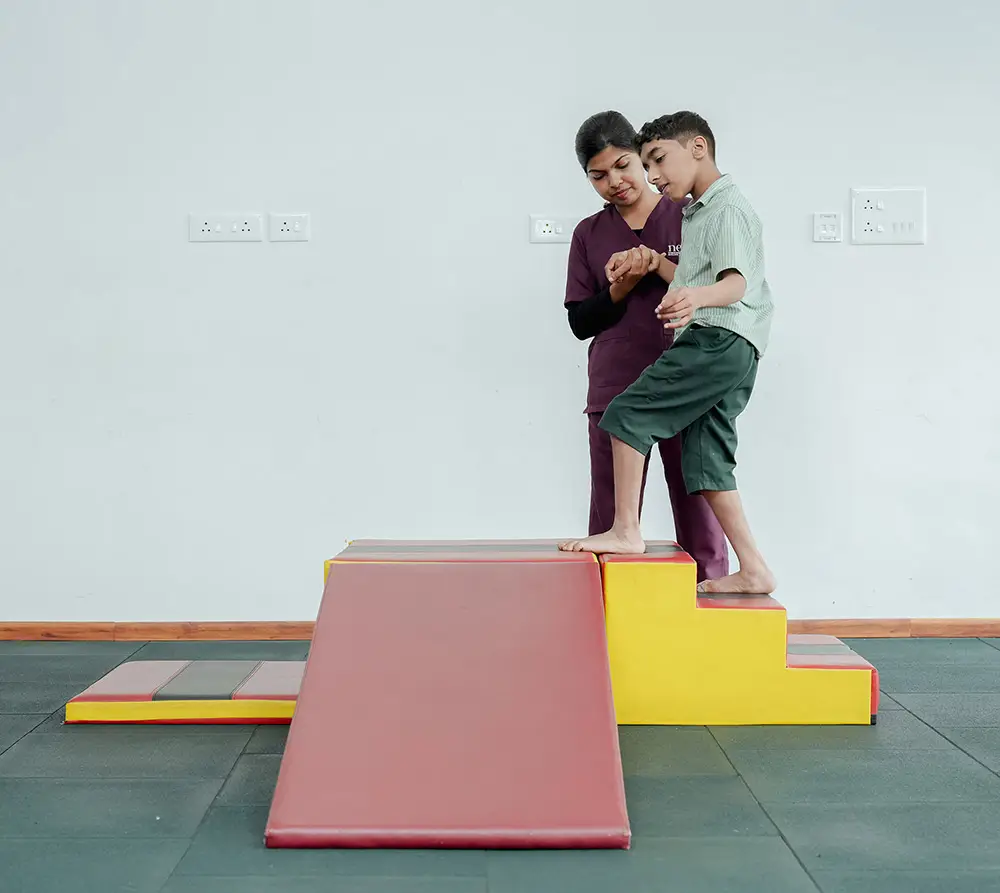
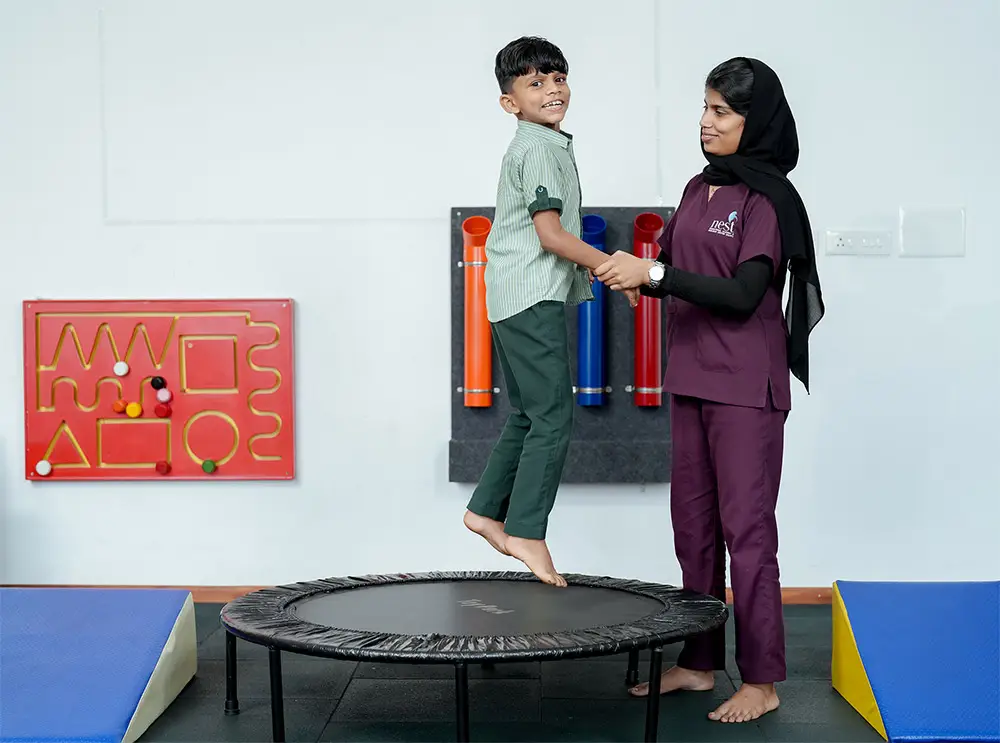
Occupational Therapy
Empowering children to embrace their individuality and live independently is at the heart of Occupational Therapy. Through the therapeutic power of play, self-care, learning, and leisure activities, we embark on a transformative journey. Our goal is to equip each child with the skills they need for everyday life, fostering independence through our personalized one-on-one training program.
- Developmental motor intervention
- Fine motor skill training , Hand function training
- Balance and coordination training
- Training of Activities of daily living (ADL) and Instrumental ADL
- Sensory integration
- Cognitive retraining – Attention , Concentration
- Oral/motor feeding and swallowing training
- Visual perception retraining
- Auditory and Vestibular retraining
- Rest , Sleep preparation and participation
- Play and Leisure exploration and participation
- Social participation – Family , Peer , Community
- Environmental adaptations and adaptive devices
Speech & Language Therapy
All that we focus is on the mastery of Speech & Language Therapy, delivering holistic support to children grappling with speech, language, or swallowing challenges. Our dedicated Speech therapists work closely with each child individually, tailoring their approach to address the unique challenges they face. We employ specialized programs like the Picture Exchange Communication System (PECS), articulation programs, and auditory-verbal therapy to help children progress and thrive in their communication abilities.
Our group therapy sessions are designed to promote social engagement, enhance communication skills, and cater to each child’s specific abilities and needs. We do not just focus on the child — we extend our support to parents as well, guiding them on how to encourage and foster effective communication with their children. For those requiring assistance with feeding or dealing with swallowing difficulties, our therapists provide valuable insights into safe feeding strategies and swallowing techniques. At NIARC, we are committed to breaking down communication barriers and nurturing the development of every child we work with.
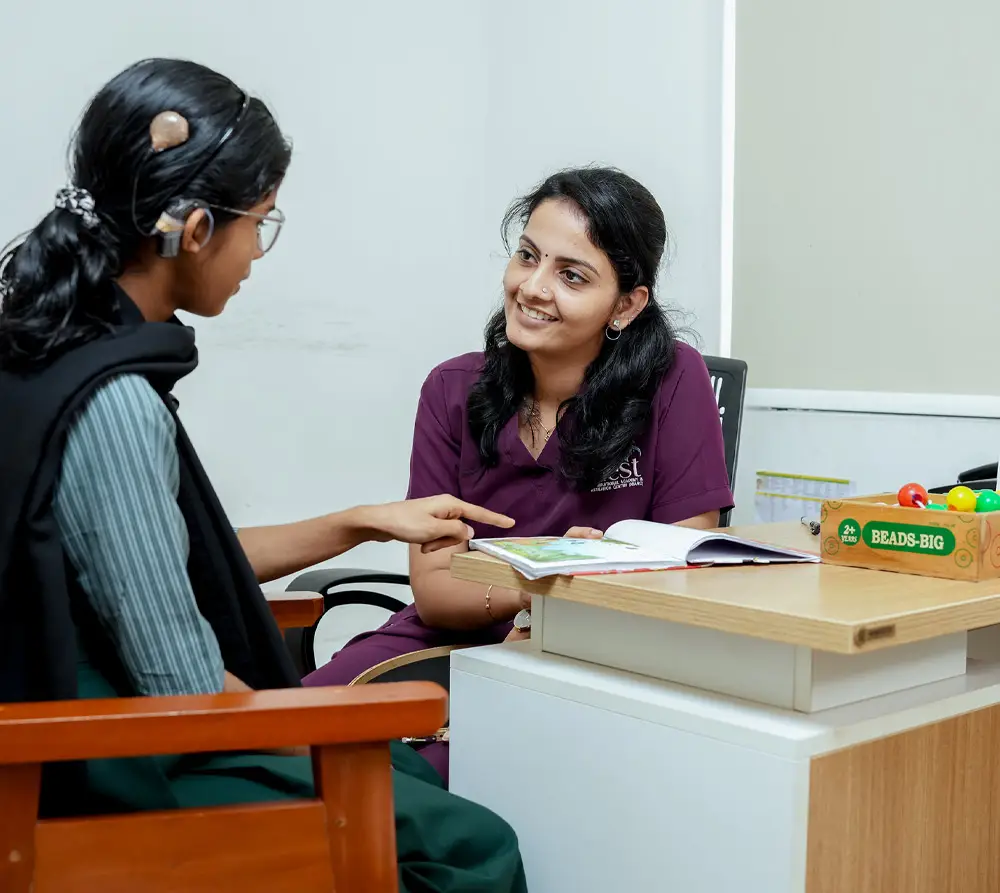
GROUP THERAPY
Group speech therapy is a functional method of helping a child learn new skills and work towards their goals in a realistic environment. Joining groups satisfies our need to belong, gain information and understanding through social comparison, define our sense of self and social identity. Group therapy helps to Mimics real-world environment, speech and language modelling and correction through recasting.
Improved social communication, group speech therapy also helps to alternative communication methods. Group speech therapy can build on existing speech and language skills, such as articulation, and encourage the development of pragmatic language skills.
- Speech-articulation, voice, fluency (stuttering)
- Receptive and expressive language
- Communication
- Hearing Impairment
- Hearing aid / cochlear implant selection
- Counselling about care and maintenance of aids
- Auditory training
- Speech therapy
- Home training
- Regular follow up
- Preschool program
- School program – Segregation and Integration
- Augmentative and alternate communication (AAC)
- Cognition
- Language-based reading difficulties
- Oro-motor dysfunction
- Swallowing and feeding disorders
- Therapeutic listening
- Central auditory processing disorders
- Standardized developmental testing
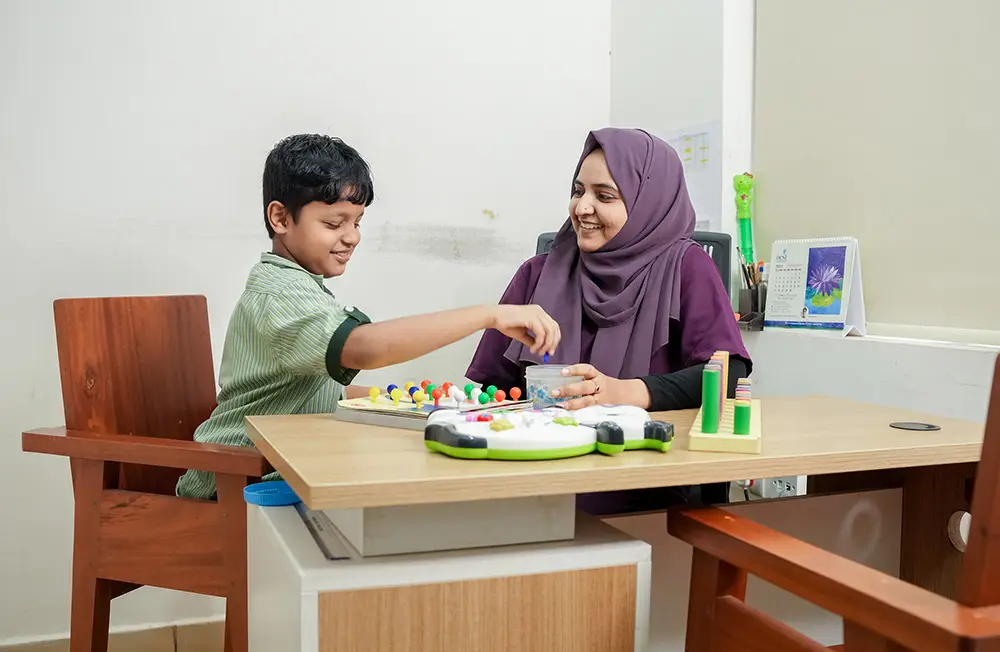
Clinical Child Psychology
Clinical Child Psychology under the department of psychology functions with an aim to promote excellent paediatric rehabilitation services through evidence based global practices and technologies. That gives importance for early intervention. We provide diverse comprehensive diagnostic evaluation and therapeutic interventions.
Our professional team of clinical psychologists and family counsellor in adherence with the code of ethics ensures equitable treatment.
Group Therapy
The structured environment for children to practice different social skills, coping skills, play skills and other important life skills. It brings multiple children together in a group setting to work through various emotional, behavioural and social challenges. Here, children go through various meaningful games, play activities, role play, social stories, worksheets, toys, arts music and dance movement therapy techniques. Group therapy also emphasizes the ability of self-regulation and helps to connect with others in similar situations.
Beneficiary groups of children involve autism, IDD, down syndrome, ADHD, Child with communication difficulties &anxiety and other neuro divergent groups .
- Psychological Assessments – IQ , Learning disability, Socio-adaptive functioning, Development, Autism, ADHD, Behavioural
- Diagnostic Formulation
- Functional Behaviour Analysis
- Applied Behaviour Analysis
- Behavioural Therapy
- Attention Enhancement Strategies
- Behaviour Modification
- Cognitive Behaviour Therapy
- Relaxation Training
- Parental Counselling/Guidance
- Family Counselling
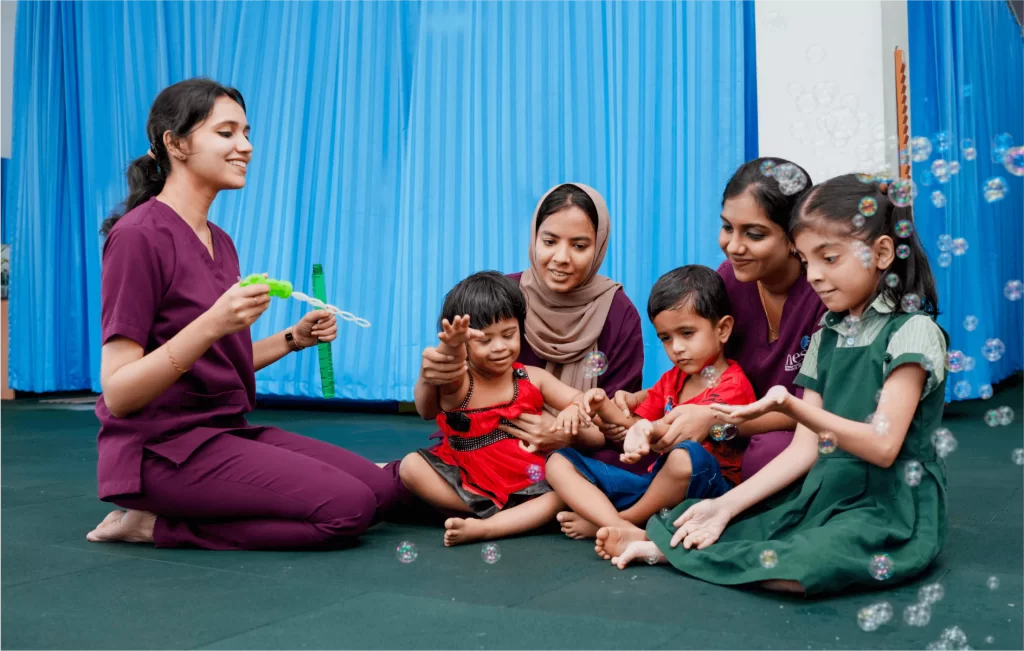
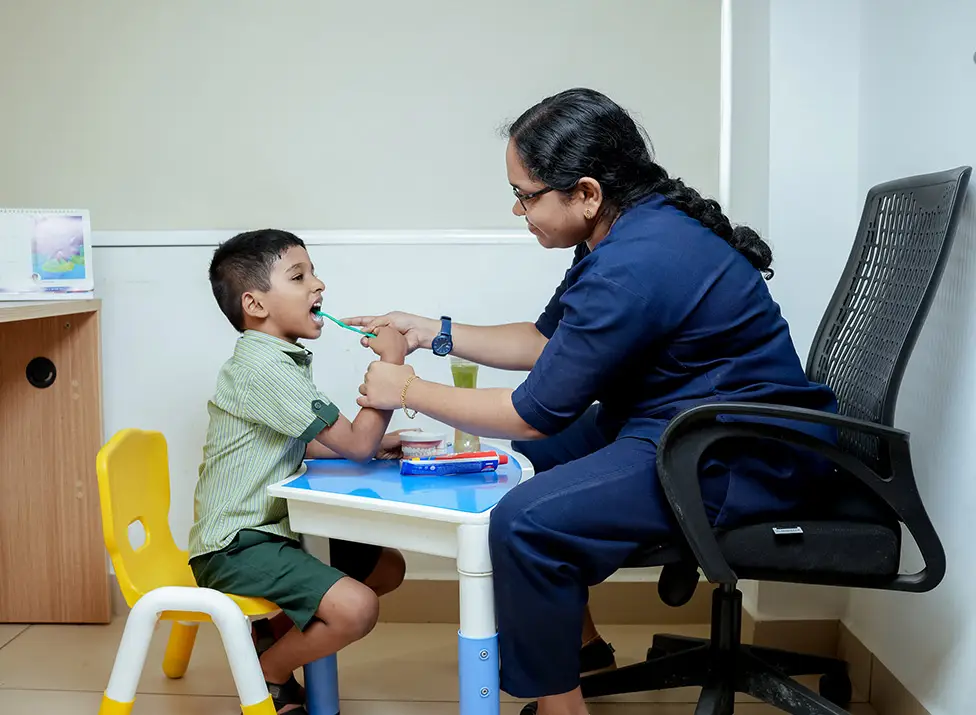
ADL (Activities of Daily Living)
Activities of Daily Living (ADLs): Activities of daily living are activities related to personal care. They include bathing or showering, dressing, getting in and out of bed or a chair.
Intellectual disability is one of mental disorder occured during developmental time and resulting low intellectual function compare to average people in general and also the decreasing function of adaptive behavior. Adaptive behavior is the ability to conduct daily activities such as communicating, socializing, and self care. A child is predicted to have obstacle in adaptive behavior if his/her development is delayed from the developmental milestone since two months to five years old. Thus, in their teenage time, the children with intellectual disability are still not able to act like normal teenagers. Young people with intellectual disabilities tend to achieved their own needs, however, their efforts are often failed. These can lead to deviant behavior in young people with intellectual disabilities and interrupting their social development. Young people with intellectul disabilities experiencing limitation in trying to conduct their daily activities, thus they are highly dependent to others.
The basic ADL include the following categories:
- Ambulating: The extent of an individual’s ability to move from one position to another and walk independently.
- Feeding: The ability of a person to feed oneself.
- Dressing: The ability to select appropriate clothes and to put the clothes on.
- Personal hygiene: The ability to bathe and groom oneself and maintain dental hygiene, nail, and hair care.
- Continence: The ability to control bladder and bowel function
- Toileting: The ability to get to and from the toilet, using it appropriately, and cleaning oneself
The instrumental ADLs are those that require more complex thinking skills, including organizational skills.
- Transportation and shopping: Ability to procure groceries, attend events Managing transportation, either via driving or by organizing other means of transport.
- Managing finances: This includes the ability to pay bills and managing financial assets.
- Shopping and meal preparation, i.e., everything required to get a meal on the table. It also covers shopping for clothing and other items required for daily life.
- Housecleaning and home maintenance. Cleaning kitchens after eating, maintaining living areas reasonably clean and tidy, and keeping up with home maintenance.
- Managing communication with others: The ability to manage telephone and mail.
- Managing medications: Ability to obtain medications and taking them as directed.
Individualized Education Program (IEP)
Individualized Education Program (IEP) is meticulously created to address the unique learning challenges of each child, encompassing precise educational objectives. Developing an IEP involves evaluating students across all relevant areas tied to their identified disabilities. Simultaneously, it takes into account their capacity to engage with the standard curriculum and how their disability influences their learning process. The process includes formulating goals and objectives that align with the student’s requirements and selecting the least restrictive environment feasible for the student. It also considers the utilization of adaptive devices and alternative communication methods.
The main purpose of IEP is to provide appropriate education and training to every child with mental retardation. As no two mentally retarded children have similar abilities and needs, the development of IEP depends on the needs of the child
The IEP will focus only on the areas that are affected by the disability(ies). The IEP will provide a focus for the student’s learning and designate the time for the student to successfully complete the benchmark objectives on the way to mastering the IEP Goal. The IEP should reflect as much as possible what the student’s peers are learning, which provides an age-appropriate approximation of the general education curriculum. The IEP will identify supports and services the student needs for success.
General background information about the child:the data is collected the child is brought to the school
- Family background
- Details about siblings
- Socioeconomic status
- Prenatal,natal,postnatal history
- Developmental history
- Other relevant factors
Assessment is the most important component of IEP because the haul programme depend on the assessment
NRT(Norm Reference Test)-NRT is a standardised measure Eg:intelligence test,achievement test
CRT(Criterion Reference Test)-CRT compare students performance to a fixed criteria Eg:teacher made test
The assessment of current level of functioning of the child must include
Motor skills
Gross motor & fine motor
Self help skill
Eating ,mealtime ,toileting ,dressing, grooming
Language skills
Receptive language or expressive language
Social skills
Academic skills Reading,writing,number,time,money
Measurement
Orientation skills
Recreational skills
- Ability of the child
- Needs of the child
- Functionally relevant goal
- Priority needs of the child
- Parental involvement
- Play-way method
- Project method
